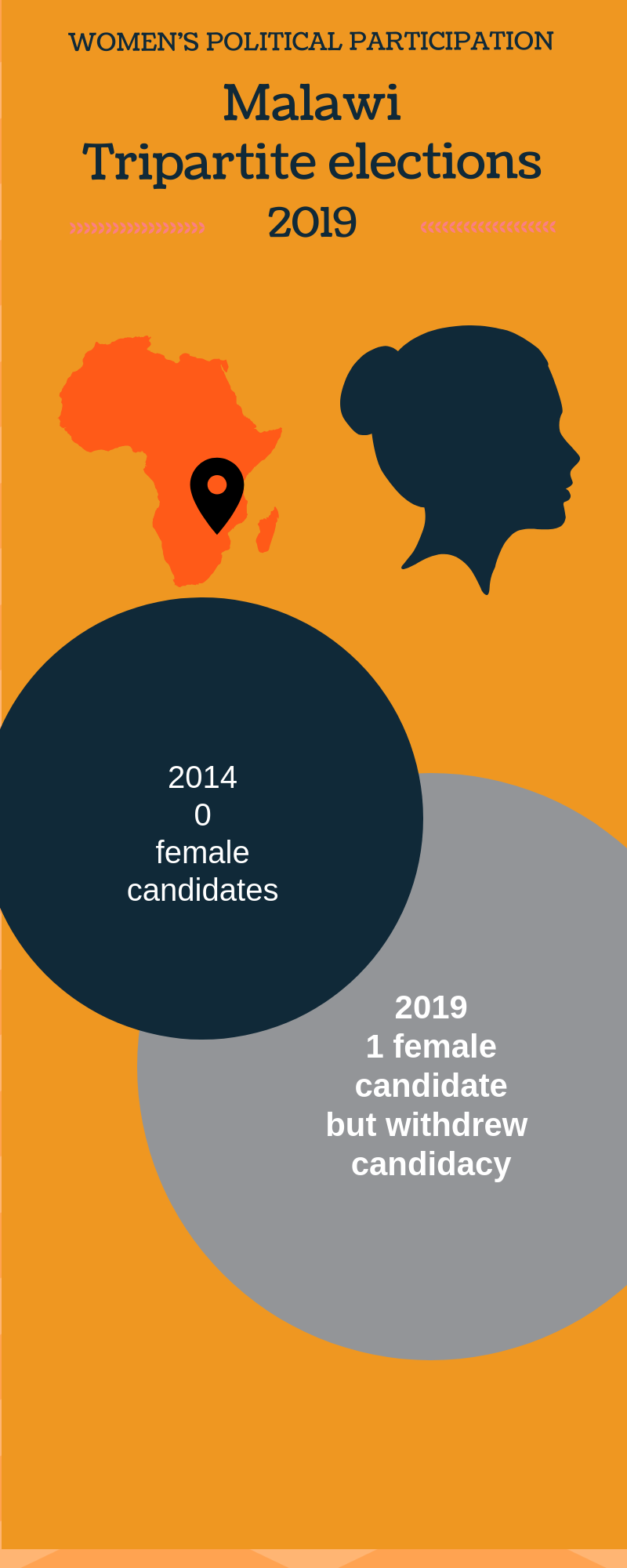By: Ida W. Djiguimde
The elections for president, parliamentarians and local councilors in Malawi took place on May 21st, 2019.
Malawian citizens went to the polls for a tripartite election to choose the president of their nation, parliamentarians, and local councilors. The electoral committee proclaimed Peter Mutharika of the Democratic Progressive Party (DPP) the winner of the 2019 presidency with 38.57% of votes casted. He is expected to hold the presidency office for the second and last time for a period of 5 years. This year’s election was a tight race with the other candidates scoring not farther behind the winner with Lazarus Chakwera scoring 35.41% in second position and Saulos Chilima on third place with 20.24% votes. Malawi has a “winner takes all” system where there is no need for a second round of votes regardless of the gap between candidates. Mutharika’s score this year is similar to the 2014 election where he won with just 36% of votes.
Malawi has been independent from Britain since 1964 and has since been under a single party rule until 1994 where it shifted to a multi-party state. The country has a unicameral political structure and elections for president as well as parliamentarians are conducted every five years. This is the second time in the country’s history where all 3 elections are held together. With an estimated population of 18 million people, the number of registered voters was 6,859,570 million, with 54.3% accounting for the youth. Malawian constitution decrees any citizen residing in Malawi and having reached the age of 18 is eligible to register and vote. Votes outside the territory are not allowed for the time being.
Also, for the first time in the country’s history, Malawi moved from a paper-based voter registration to a biometric one. This measure is helpful in preventing fraudulent and duplicate registrations. The highlighted issues at stake for this election were among others, the fight against corruption, the protection for Albinos people, and youth employment. Overall 8 candidates were seeking presidency and 1331 parliamentarians candidates were running for a total 193 seats available.
There were tensions that raised during the elections period because of the political division between Mutharika and Chilima who left DPP to form a new party, the United Transformation Movement. Also, Joyce Banda, former president dropped out of the presidential race midway, offering her support to the major opposition leader Chakwera of the Malawi Congress Party.
Women's Political Participation
Malawi’s first female president, Joyce Banda, was initially the only female candidate in the race for presidency this year, but she dropped halfway and offered her support to the opposition leader Lazarus Chakwera. Banda served as vice-president under Bingu wa Mutharika but took office as president following his death, serving from 2012 to 2014. She had voluntarily exiled herself after the famous corruption case in Malawi known as Cashgate scandal.
Currently, 32 women seat in the Malawi Parliament, which stands for 16.7% of Parliamentarians. This number however has drastically dropped from the years 2011 to 2013 when the proportion of seats held by women was at its highest value at 22.30%. The reason for the decline of the rate in women representation in Parliament is due to the limited financial resources issue that women face and also to an educational system that has preference for men over women.
Malawi has ratified the Convention on the Elimination of Discrimination Against Women (CEDAW) since 1987, as well as the Maputo Protocol in 2005, but the country currently does not have a gender quota system in place, thus only relying on voluntary gender quotas from political parties.
Based on records from AWD Report, Malawi introduced the Gender Equality Act in 2012 in efforts promote gender equality on all aspects of society. The country also took progressive steps towards improving retention rates of girls in primary and secondary education through the implementation in 2014 of the National Girls Education Strategy. This strategy was followed in 2015 by important legislations to outlaw child marriage.
The country is making major strides towards women’s participation in decision-making. This year, Malawi chose Catherine Gotari Hara as speaker of the Parliament, the first woman to ever hold this position. Moreover, Fyness Magonjwa, a 23-year-old woman, came out of this year’s election not only as the country’s youngest legislator but also of the whole the African continent. Another stride for women leadership in this election is the that the electoral committee was led by a female election chief, Dr. Jane Ansah. Traditionally, members of electoral committees on the continent are predominantly men.
Conclusion
Women’s political participation in Malawi is constantly fluctuating. Despite the ratification of international treaties that guarantee women rights, women are still struggling to access or remain in decision-making positions, due to the lack of funding and deeply rooted traditional gender stereotypes that disadvantage them. The lack of quotas is a contributing setback for women leadership in the country. Though the country’s political landscape remains male dominated, women are actively working to affirm themselves.
Malawi must adopt a gender quota system that will ensure women’s participation in decision-making and further prevent a decline in the number of women in leadership positions.
